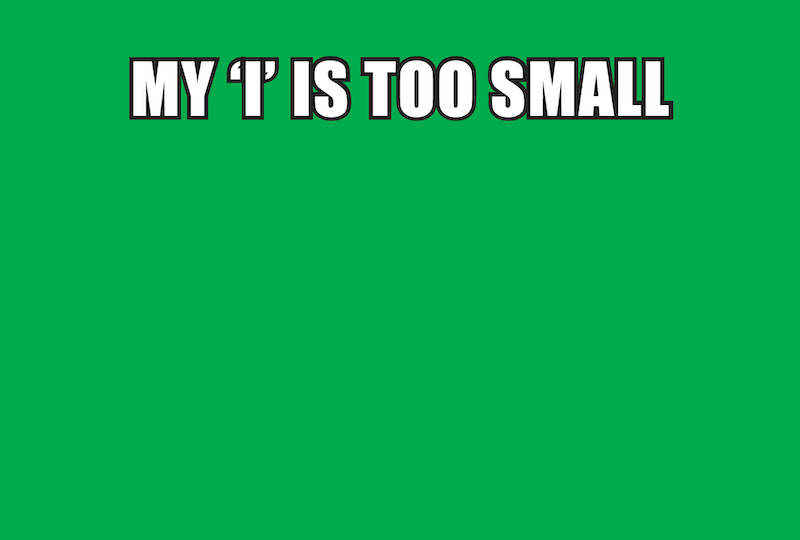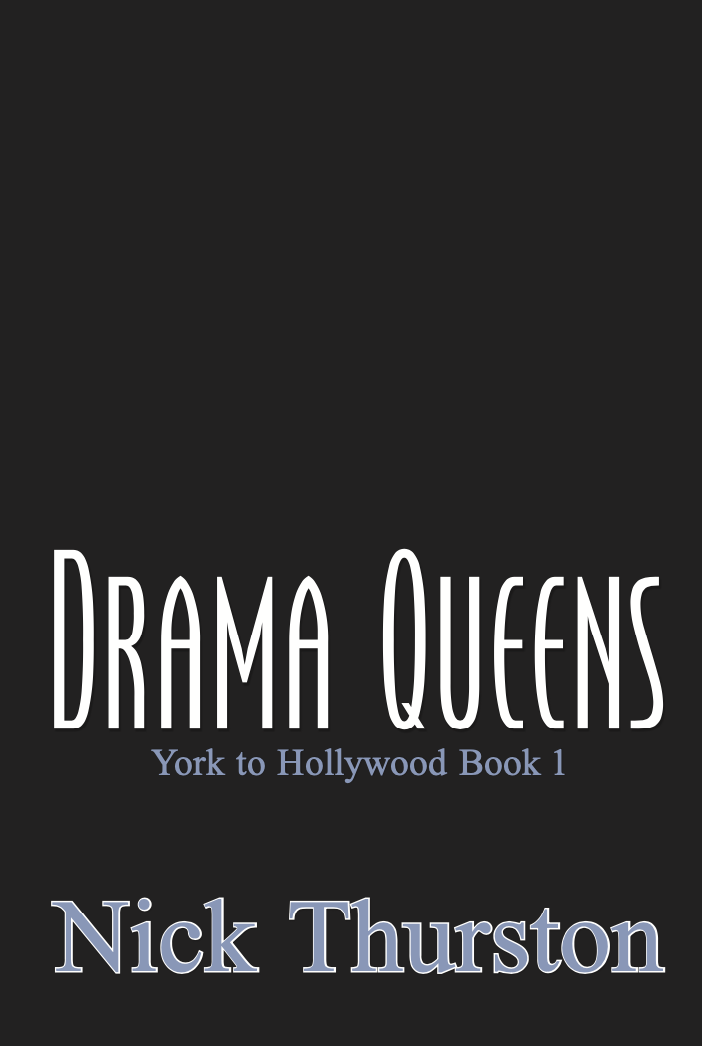
Edgar Allan Poe’s “William Wilson” recounts how the protagonist, William Wilson, is haunted, harassed, and badgered by his doppelgänger. It’s a masterful tale of psychological horror and an avant la lettre rendering of Freud’s uncanny. When we stare into the eyes of that familiar yet alien visage that is ourselves, Poe asks, who do we see? As anyone who’s ever been with an analyst before knows, the fastest way to unravel is to encounter yourself as you truly are…which turns out to be a fantasy.
But Poe’s story is literally dozens of pages long and who has time for that, right?
For a better, more contemporary, and faster rendering of the uncanny, check out Nick Thurston’s Drama Queens: York to Hollywood, Book 1 (Make Now 2020), a bravura stitching together of multiple iterations of internet personas with the same name: Nick Thurston. In this fanfiction about himself, Nick writes of the adventures of the IRL actor Nick Thurston playing a bit part in an Amazon Kindle erotica novel, all orchestrated by the teacher, artist, and writer Nick Thurston. Drama Queens raises questions about how the web and its identity-thieving surplus of personal data radically transforms our notions of authenticity, originality, and identity. In Drama Queens, Thurston takes a ride deep into the uncanny valley of the digital soul and returns with an ouroboros in the form of a literary objet d’art, a bricolaged text printed as an infinitely looping quarto.
To sort all of this out, Nick and I exchanged emails between my home base of Los Angeles and Leeds, UK where Nick teaches at the School of Fine Art, History of Art and Cultural Studies at the University of Leeds.
Aaron Winslow: Can you tell me the origin story of Drama Queens?
Nick Thurston: About a decade ago, I was vainly searching “Nick Thurston” on Google and realized there was an aspiring Hollywood actor who shared my name but dominated the search results. Soon after that humbling Google search, a group of graduate students asked me to devise a writing workshop for them. I decided to flip the modus of the workshop and turn the three sessions into editorial meetings. I told them I’d teach them basic copyediting, text-flow, and editorial management skills, if they collectively set about a strict content-production task: I asked them to each write one chapter for a speculative “auto”-biography of the name Nick Thurston. They could research it however they wanted and say anything they liked in the name of Nick Thurston.
My only input was technical and extra-textual. I made them a simple Word doc template, showed them how to compile the sections, standardize and proof the text, tidy up the typography, and served as a medium through which they could get a publisher. Their book, In My Own Words, was published in 2012 by an experimental print-on-demand press in London. I never dared read the whole thing. The bits I skimmed during the workshop wavered between worryingly accurate and actively aggressive.
What came out of that little exercise, for me, was an unhealthy interest in people who share (steal!!) my name. So, some years later (I’m not sure when), I was compiling some references to my work as part of an exercise to justify my day job, as an academic, and found “Nick Thurston” recurring on Google Books within a series of what appeared to be fanfiction books. The Amazon Look Inside tool took me straight to every mention of the name within those books and I started to collect copies. The series is called “Hollywood to Olympus” and they’re self-published commercial romance novels. I was smitten with this idea that the actor Nick Thurston was now playing himself as a bit-part character in a genre story. Or rather, I was interested in my feeling that he and I might be playing each other and ourselves simultaneously, in my imagination at least.
It just happened that Nick Thurston appears in the second volume of the series on 5 pages dotted throughout the novel. Amazon guided me straight to my namesake and I didn’t have much interest in the rest of the book. So, I scanned the non-sequential run of extracts and I wondered how much (or maybe, how little) it would take to move my namesake from his fringe role in the original novel to centre-stage in an abridged re-telling. What would happen to the text if I filled in the gaps between the extracts, as a ghost-writer? Drama Queens is as simple and deranged as that.
AW: What strikes me is not only the engagement with algorithmic self-surveillance via google searching yourself and finding an abundance of online doppelgängers, but also the way you approach it in a material and collective way–ie, using production methods and collective labor to recreate what is often done invisibly and virtually, something your project shares with a lot of other procedural and conceptual art and writing. So I’m wondering what these methods revealed to you about cyber-stalking.
NT: I think I can zoom in to an answer to your question, but I have to start big.
Art is artifice. Fundamentally, I believe in the speculative imaginary, and art for me is a way of putting the speculative imaginary into action or enacting the speculative imaginary as a form of social work. In the context of the arts, “work” always refers to a thing and an action through the form of a thing (being) done. So the social work of enactment is active, a thing we do and that remains done as “the work”. The artifice doesn’t magically appear. In the context of the language arts, when we write something, we don’t simply say something, we actually make something. Literary writing is an act of making, one bound in counter-tension with the obligation placed on all language to communicate, to articulate, to speak of and for something and someone.
For me, Drama Queens was about turning my vanity upside down. I searched my name looking for myself, for hits that might signal my impact or relevance. But “the work” was to misuse that search and ask the opposite question: what if I lost my ‘self’ on the internet? And if I managed that, what voice would I find and what could I write?
Regardless of the stalkery impulse that prompted my original search, Drama Queens is really a project about losing, about the social reproduction of loss.
AW: I have two possibly conflicting and perhaps stupid questions in response to your intelligent and in-depth response. First, do you think we lose ourselves or find ourselves on the web?
My other question is: Which Nick Thurston do you prefer and why?
NT: Ha! No one should have to suffer a therapy session with me, so I’ll answer the second part obliquely.
But, to your first question, I think it’s neither and both because we multiply ourself-s within and through networked media. I think the awkwardness of that non-word — ourself-s — is useful because spending time online isn’t a simple extension or widening of the self, nor is it a simple cloning of the one-same self, and nor is it the endless creation of truly different selves.
To exercise those parts of life that depend on the Internet, I reproduce a network of me-s. I thoughtlessly reproduce a whole cascade of me-s everytime I start a new account on a website, download a file, use cloud storage or accept a website’s cookies. Those fragmentary but real me-s are remembered as data points and I re-activate them every time I want to access an account, channel and community online.
In literature, we’re used to thinking about the multiplicity of “I” voices in the artifice of “the text”. But within media networks like the internet every user actively reproduces something different, something less considered and more real, something that doesn’t have the privilege of being true artifice because it remains connected to the author, if only through data surveillance. Those potentially infinite cascading spin-offs of “me” are what I’m calling “me-s”. And in that cascade we lose any singularity of self-hood strictly thought (in an essentialist sense, if there is such a thing) but we also explore our capacity to change without any clean break. I guess it’s memic — it’s adaptive multiplication rather than any kind of binary of find-or-lose.
All of that is why I think there’s a special connection between self-publishing and post-digital life. I think we’re all constantly self-publishing, wittingly or unwittingly. And I think the simple but profound truth of that has only begun to ring in the context of literature, where it challenges the most fundamental logic of the industry.
I guess that sets up my oblique answer to your second question: it’s just me and my-self-s, or me, myself-s, and I.
(Sorry! That’s a cringey way to finish. Blame another Nick Thurston.)

